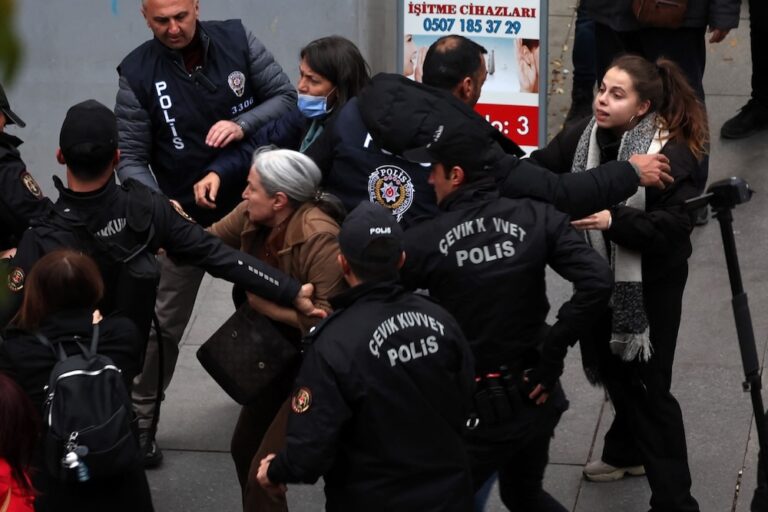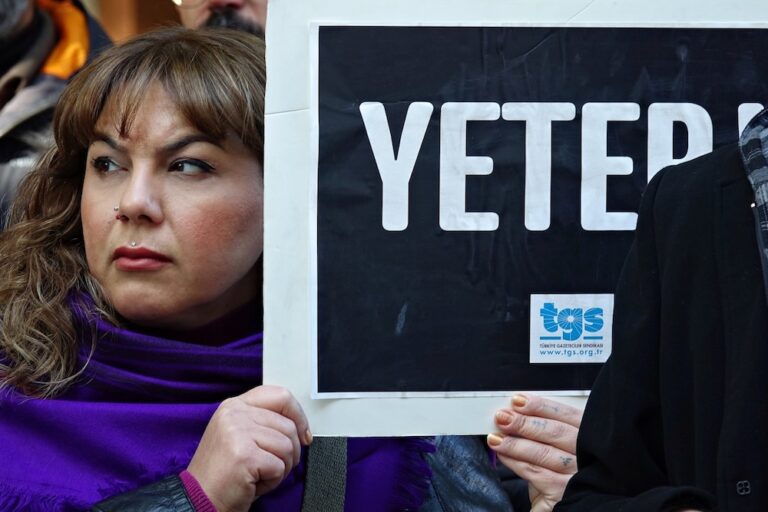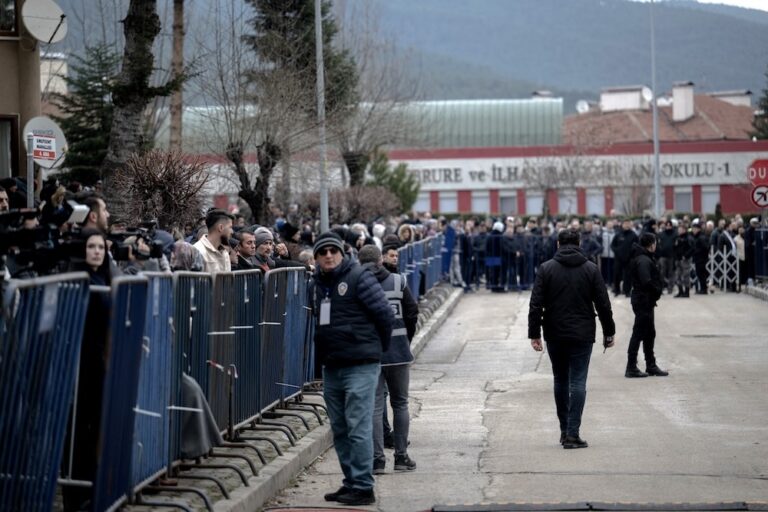(CPJ/IFEX) – During the week of 13 September 1999, a reporter with Inter Press Service (IPS), learned that she had been formally charged with “insulting” the Turkish military -a crime under Article 159 of the Turkish Penal Code. If convicted, she faces between one and six years in prison. **Updates IFEX alerts of 21 September, […]
(CPJ/IFEX) – During the week of 13 September 1999, a reporter
with Inter Press Service (IPS), learned that she had been formally charged
with “insulting” the Turkish military -a crime under Article 159 of the
Turkish Penal Code. If convicted, she faces between one and six years in
prison.
**Updates IFEX alerts of 21 September, 20 September, 10 September, 6 July
and 25 June 1999**
The charge stems from the publication of her recent book “Mehmed’s Book:
Soldiers Who Have Fought in the Southeast Speak Out”, which was banned by
Turkish authorities in June. The book consists of interviews with forty-two
retired Turkish soldiers who had fought in the civil conflict in
southeastern Turkey.
In her indictment, dated 9 August, state prosecutors cited some forty quotes
from former Turkish conscripts as the basis for the charge.
Mater’s first court hearing is scheduled to take place on 29 September, one
day after U.S. President Bill Clinton’s expected meeting with Turkish Prime
Minister Bulent Ecevit in Washington.
An Istanbul court banned distribution of “Mehmed’s Book” on 23 June,
claiming that it had insulted the military. Police confiscated copies from
the book’s Istanbul-based publisher, Metis Publishers. Prior to the ban,
four editions of the book had been printed and around 9,000 copies sold.
Mater’s recent indictment underscores the shortcomings of the amnesty law
approved by Turkey’s parliament on 18 August. The law, signed by President
Suleiman Demirel on 2 September, suspends court cases or jail terms against
individuals charged or convicted of “crimes” committed through the media for
a period of three years. A number of journalists have already been freed
under the amnesty, and dozens of court cases are expected to be quashed
temporarily.
But journalists such as Mater, who have committed “crimes” since the 23
April cutoff date, do not qualify for the amnesty. Moreover, those who do
qualify still face a three year probationary period, meaning that if they
commit a similar “offense” within the three-year period, they will be
required to serve their previous sentence in addition to any new sentence
confirmed by the courts.
As long as laws used to prosecute journalists for their published work
remain on the books in Turkey, reporters and editors will remain under
threat of prosecution and possibly imprisonment.
Text of a 21 September press release issued by Mater is added as an annex.
ANNEX
Text of a 21 September press release issued by Mater follows.
MEHMED’S BOOK AUTHOR FACES SIX YEARS
by Nadire Mater
Istanbul, September 21, 1999 – A local prosecutor in Beyoglu, Istanbul has
finally indicted me under Article 159 of the penal code ( “insulting and
belittling the military”) for having published the statements of former army
soldiers who I interviewed for my book Mehmedin Kitabi (“Mehmed’s Book –
Soldiers Who Have Fought in the Southeast Speak Out”). The book was banned
on June 23 by order of an Istanbul court.
If convicted, I could be sent to jail for one to six years. My publisher,
Semih Sokmen, was also indicted and faces a possible fine.
The ban and my indictment are ironic in that I am accused of insulting the
Turkish military for having faithfully reproduced the words of Turkish
soldiers.
Mehmedin Kitabi comprises interviews with 42 retired Turkish soldiers and 2
relatives of soldiers who had fought in southeast Turkey. The book was first
printed in April 1999 by Metis Publishers in Istanbul, and has been through
three additional printings since then. It was warmly welcomed by critics of
all political stripes, both overseas and in Turkey.
Nonetheless, the authorities are putting me on trial. The indictment is
based on quotations that the prosecutor has selected out of context in order
to support his charges. The first hearing will take place on September 29 in
Istanbul’s Beyoglu Court Hall.
After the court decision authorizing the seizure of my book, I immediately
petitioned the Ministry of Justice to withdraw the charges. The ministry of
Justice responded to my plea by stating that “Turkish justice is independent
of the executive, and no authority is entitled to order the judges …”
Yet the indictment clearly states that the prosecution was initiated at the
demand of Deputy Chief of Staff General Hilmi Ozkok. Moreover, it lists the
army chief of staff as the prosecution’s “informant.”
Apart from this apparent intervention by the executive branch, the timing of
the indictment is also ironic in that it comes shortly after the Turkish
government’s announcement of a special amnesty for jailed journalists and
writers. This, the government believes, is a sign of the ruling coalition’s
attachment to freedom of expression.
My case and scores of other cases are stark evidence of this amnesty’s
cosmetic nature and limited scope. The amnesty does not annul past
“offenses” but only suspends them for the next three years. Moreover, it
will not be valid for “offenses” committed later than April 23, 1999.
Finally, the amnesty has not been accompanied by any change in the many laws
that are used to criminalize the
profession of journalism in Turkey.
Under the amnesty I will not be prosecuted for the first printing in April.
But I am still threatened with prison sentences for the next three
printings, which all came after April 23. But even if the amnesty also
applied to later editions, the banning of my book would still stand. I am
therefore delighted that I still have a chance to defend myself and that the
book may re-circulate if I am
acquitted.
The ruling coalition claims to have broadened freedom of expression and
thought in Turkey. But this indictment is fresh evidence that in the absence
of substantive change in Turkish law, grave threats against basic freedoms
of thought, expression, and information still prevail.
I will be presenting my first court defense on September 29. I ask for the
support and solidarity of human rights activists, writers, journalists, and
intellectuals in Turkey and overseas. If we all cooperate, I am confident
that we can overcome restrictions and limitations on freedom of expression
in Turkey and throughout the world.
Nadire Mater
Tel: +90 212 518 8376-77
Fax: 518 8375
e-mail: nadire@turk.net
mobile: +90 532 231 3836


